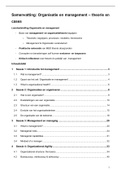lOMoARcPSD|2374147
Samenvatting: Organisatie en management – theorie en
cases
Leerdoelstelling Organisatie en management
- Basis van management- en organisatietheorie begrijpen
o Theorieën, begrippen, processen, modellen, frameworks
o Management & Organisatie vocabularium
- Praktische relevantie van M&O theorie doorgronden
- Concepten en benaderingen zelf kunnen evalueren en toepassen.
- Kritisch reflecteren over theorie én praktijk van management
Inhoudstafel
1 Sessie 1: Introductie tot management .......................................................................3
1.1 Wat is management? .......................................................................................................... 3
1.2 Opzet van het vak ‘Organisatie en management’ ............................................................... 4
1.3 What is organizational health? ............................................................................................ 6
2 Sessie 2: Organisaties en organiseren ......................................................................9
2.1 Wat is een organisatie?....................................................................................................... 9
2.2 Doelstellingen van een organisatie ................................................................................... 10
2.3 Structuur van een organisatie ........................................................................................... 14
2.4 Evolutie van het organisatiedenken .................................................................................. 15
2.5 De organisatie van de toekomst........................................................................................ 18
3 Sessie 3: Management en managing .......................................................................20
3.1 What is management? ...................................................................................................... 20
3.2 Managerial roles................................................................................................................ 24
3.3 Managerial capabilities...................................................................................................... 31
3.4 Mindset of a manager ....................................................................................................... 32
4 Sessie 4: Organizational Agility ................................................................................33
4.1 Organizational structure: the basics .................................................................................. 34
4.2 Bureaucracy, meritocracy & adhocracy ............................................................................ 40
1
, lOMoARcPSD|2374147
4.3 Organizational agility ......................................................................................................... 43
5 Sessie 5: Kennis en leerprocessen ..........................................................................51
5.1 Tacit knowledge as key to organizational learning............................................................ 52
5.2 Organizational learning & the learning organization ......................................................... 55
5.3 Failure and learning .......................................................................................................... 59
6 Sessie 6: Organisatieverandering ............................................................................61
6.1 What is (organizational) change?...................................................................................... 61
6.2 Why is organizational change difficult? ............................................................................. 63
6.3 Perspective 1 : Planned change ....................................................................................... 66
6.4 Perspective 2 : Emergent change ..................................................................................... 73
7 Sessie 7: Besluitvormingsprocessen ......................................................................76
7.1 What is decision-making? ................................................................................................. 77
7.2 Rational decision-making processes................................................................................. 78
7.3 Intuitive decision-making ................................................................................................... 81
7.4 Bounded rationality, heuristics & cognitive bias ................................................................ 83
7.5 Lessons from practice: RWE case .................................................................................... 86
8 Sessie 8: Organisatiecultuur .....................................................................................87
8.1 What is organizational culture? ......................................................................................... 87
8.2 The importance of organizational culture .......................................................................... 91
8.3 Competing Values Framework & Organizational Culture Assessment Instrument (OCAI)
93
9 Sessie 9: Leiderschap .............................................................................................102
9.1 What is leadership?......................................................................................................... 102
9.2 Typology of leadership theories ...................................................................................... 105
9.3 Paradox-inspired styles of leadership ............................................................................. 109
10 Sessie 10: Motivatie ..............................................................................................115
10.1 Waarom?......................................................................................................................... 115
10.2 Klassieke motivatietheorieën .......................................................................................... 116
10.3 Hedendaagse motivatietheorieën ................................................................................... 119
2
, lOMoARcPSD|2374147
10.4 Motivatie in de praktijk – take 1 ....................................................................................... 124
10.5 Motivatie in de praktijk – take 2 ....................................................................................... 127
1 Sessie 1: Introductie tot management
1.1 Wat is management?
What do managers do?
What are typical roles of managers?
What qualities do managers need?
- Ambitious (hard working, aspiring)
- Broad-minded (open-minded, flexible, receptive)
- Caring (sensitive, appreciative, concerned, loving)
- Competent (capable, productive, effective, efficient, thorough)
- Cooperative (friendly, team player, available, responsive)
- Courageous (daring, stands up for own beliefs)
- Dependable (reliable, conscientious, responsible)
- Determined (hard-working, persistent, purposeful, steadfast)
- Fair-minded (objective, forgiving, willing to pardon others, consistent)
- Forward-looking (visionary, foresighted, concerned about the future, sense of direction)
- Honest (truthful, has integrity, trustworthy, has character)
- Imaginative (creative, innovative, curious)
- Independent (self-reliant, self-sufficient, self-confident)
- Inspiring (uplifting, enthusiastic, energetic, humorous, cheerful, positive about future)
- Intelligent (bright, thoughtful, intellectual, reflective, logical)
- Loyal (obedient, dutiful, respectful, committed to company)
- Mature (experienced, wise, has depth)
- Self-controlled (restrained, self-disciplined)
- Straightforward (direct, candid, forthright)
- Supportive (understanding, helpful)
3
, lOMoARcPSD|2374147
Management is echter moeilijk omdat er meerdere manieren zijn om naar de dingen te kijken. Dit is
niet enkel en alleen maar de verschillende managementperspectieven, maar ook perspectieven van
verschillende stakeholders. Management is nooit zwart-wit.
Why is management so difficult?
- People
- Non-rationality
- Social, cognitive, affective processes
- Macro, meso, micro levels
- Dynamic complexity
- Paradox
- Interdependencies
- Power and politics
- …
1.2 Opzet van het vak ‘Organisatie en management’
Doelstellingen:
- Begrijpen
- Kritisch evalueren
- Toepassen
- Illustreren
- Argumenteren
- Reflecteren
- Analyseren
- Discussiëren
4
, lOMoARcPSD|2374147
In dit vak beginnen we bij de Unconscious Incompetence. We starten vanuit een situatie waarin
we dom zijn en er onwetendheid bestaat over deze domheid.
1.2.1 Pillar 1: a paradox perspective
Paradox / Dialetical thinking:
"The test of a first-rate intelligence is the ability to hold two opposed ideas in mind at the
same time and still retain the ability to function."
Example:
5




